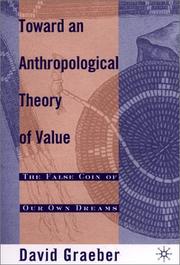| Listing 1 - 10 of 67 | << page >> |
Sort by
|
Book
ISBN: 9781612194196 Year: 2014 Publisher: Brooklyn, N.Y. Melville House
Abstract | Keywords | Export | Availability | Bookmark
 Loading...
Loading...Choose an application
- Reference Manager
- EndNote
- RefWorks (Direct export to RefWorks)
Here anthropologist David Graeber presents a stunning reversal of conventional wisdom: he shows that before there was money, there was debt. For more than 5,000 years, since the beginnings of the first agrarian empires, humans have used elaborate credit systems to buy and sell goodsthat is, long before the invention of coins or cash. It is in this era, Graeber argues, that we also first encounter a society divided into debtors and creditors. Graeber shows that arguments about debt and debt forgiveness have been at the center of political debates from Italy to China, as well as sparking innumerable insurrections. He also brilliantly demonstrates that the language of the ancient works of law and religion (words like guilt, sin, and redemption) derive in large part from ancient debates about debt, and shape even our most basic ideas of right and wrong. We are still fighting these battles today without knowing it.
International finance --- VIOLENCE -- 332.4 --- CLASS SOCIETY -- 332.4 --- Debt --- -Money --- -Financial crises --- -Crashes, Financial --- Crises, Financial --- Financial crashes --- Financial panics --- Panics (Finance) --- Stock exchange crashes --- Stock market panics --- Crises --- Business cycles --- Currency --- Monetary question --- Money, Primitive --- Specie --- Standard of value --- Exchange --- Finance --- Value --- Banks and banking --- Coinage --- Currency question --- Gold --- Silver --- Silver question --- Wealth --- Indebtedness --- History --- -History --- -Currency --- Crashes, Financial --- History.
Book
ISBN: 9781612195186 9781612193748 1612195180 9781612194486 9781612193755 1612193749 1612193757 Year: 2015 Publisher: [Place of publication not identified] Melville House
Abstract | Keywords | Export | Availability | Bookmark
 Loading...
Loading...Choose an application
- Reference Manager
- EndNote
- RefWorks (Direct export to RefWorks)
From the author of the international bestseller Debt: The First 5,000 Years comes a revelatory account of the way bureaucracy rules our lives Where does the desire for endless rules, regulations, and bureaucracy come from? How did we come to spend so much of our time filling out forms? And is it really a cipher for state violence? To answer these questions, the anthropologist David Graeber-one of our most important and provocative thinkers-traces the peculiar and unexpected ways we relate to bureaucracy today, and reveals how it shapes our lives in ways we may not even notice...though he also suggests that there may be something perversely appealing-even romantic-about bureaucracy. Leaping from the ascendance of right-wing economics to the hidden meanings behind Sherlock Holmes and Batman, The Utopia of Rules is at once a powerful work of social theory in the tradition of Foucault and Marx, and an entertaining reckoning with popular culture that calls to mind Slavoj Zizek at his most accessible. An essential book for our times, The Utopia of Rules is sure to start a million conversations about the institutions that rule over us-and the better, freer world we should, perhaps, begin to imagine for ourselves.
Public administration --- Bureaucracy. --- History. --- Bureaucracy --- Social structure --- Power (Social sciences) --- Liberalism --- Technological innovations --- Imagination --- Stupidity --- Sociology of organization --- Political sociology --- Economics --- Environmental protection. Environmental technology --- Social aspects --- Liberalism. --- Technological innovations. --- Imagination. --- Stupidity. --- Social aspects.

ISBN: 9780312240455 0312240457 0312240449 9780312240448 9780312299064 Year: 2001 Publisher: New York: Palgrave,
Abstract | Keywords | Export | Availability | Bookmark
 Loading...
Loading...Choose an application
- Reference Manager
- EndNote
- RefWorks (Direct export to RefWorks)
Now a widely cited classic, this innovative book is the first comprehensive synthesis of economic, political, and cultural theories of value. David Graeber reexamines a century of anthropological thought about value and exchange, in large measure to find a way out of ongoing quandaries in current social theory, which have become critical at the present moment of ideological collapse in the face of Neoliberalism. Rooted in an engaged, dynamic realism, Graeber argues that projects of cultural comparison are in a sense necessarily revolutionary projects: He attempts to synthesize the best insights of Karl Marx and Marcel Mauss, arguing that these figures represent two extreme, but ultimately complementary, possibilities in the shape such a project might take. Graeber breathes new life into the classic anthropological texts on exchange, value, and economy. He rethinks the cases of Iroquois wampum, Pacific kula exchanges, and the Kwakiutl potlatch within the flow of world historical processes, and recasts value as a model of human meaning-making, which far exceeds rationalist/reductive economist paradigms.
Values. --- Anthropology --- Social values. --- Ceremonial exchange. --- Valeurs (Philosophie) --- Anthropologie --- Valeurs sociales --- Echange cérémoniel --- Philosophy. --- Philosophie --- Values --- Social Values --- Ceremonial exchange --- Philosophy --- #SBIB:39A3 --- Antropologie: geschiedenis, theorie, wetenschap (incl. grondleggers van de antropologie als wetenschap) --- Echange cérémoniel --- Social values --- Axiology --- Worth --- Aesthetics --- Knowledge, Theory of --- Metaphysics --- Psychology --- Ethics --- Gift exchange --- Exchange --- Rites and ceremonies --- Anthropology - Philosophy --- Sociology --- Economic sociology

ISBN: 9780972819640 0972819649 Year: 2004 Publisher: Chicago : Prickly Paradigm Press : Distributed by University of Chicago Press,
Abstract | Keywords | Export | Availability | Bookmark
 Loading...
Loading...Choose an application
- Reference Manager
- EndNote
- RefWorks (Direct export to RefWorks)
Political anthropology --- Anarchism. --- State, The. --- Anthropologie politique --- Anarchisme --- Etat --- Philosophy. --- Philosophie --- Administration --- Commonwealth, The --- Sovereignty --- Political science --- Anarchism and anarchists --- Anarchy --- Government, Resistance to --- Libertarianism --- Nihilism --- Socialism --- Anthropology, Political --- Government, Primitive --- Ethnology --- Anthropological aspects

ISBN: 9780253219152 9780253349101 0253219159 0253349109 9786612078446 0253116996 1282078445 9780253116994 9781282078444 6612078448 Year: 2007 Publisher: Bloomington Indiana University Press
Abstract | Keywords | Export | Availability | Bookmark
 Loading...
Loading...Choose an application
- Reference Manager
- EndNote
- RefWorks (Direct export to RefWorks)
An epic account of the power of memory in Madagascar
Ethnology --- Slavery --- Betafo (Madagascar) --- History. --- Social life and customs. --- Abolition of slavery --- Antislavery --- Enslavement --- Mui tsai --- Ownership of slaves --- Servitude --- Slave keeping --- Slave system --- Slaveholding --- Thralldom --- Crimes against humanity --- Serfdom --- Slaveholders --- Slaves --- Cultural anthropology --- Ethnography --- Races of man --- Social anthropology --- Anthropology --- Human beings --- Enslaved persons

ISBN: 9781904859666 1904859666 Year: 2007 Publisher: Oakland (Calif.): AK Press,
Abstract | Keywords | Export | Availability | Bookmark
 Loading...
Loading...Choose an application
- Reference Manager
- EndNote
- RefWorks (Direct export to RefWorks)
Essays over hiërarchie, rebellie en verlangen.
Economic anthropology --- Capitalism. --- Consumption (Economics) --- Anthropologie économique --- Capitalisme --- Consommation (Economie politique) --- Capitalism --- Hierachies --- Philosophy --- Social aspects --- Anthropologie économique --- Economic anthropology - Philosophy --- Hierachies - Social aspects --- Consumption (Economics). --- Philosophy. --- Social aspects.

ISBN: 9781933633862 9781612191294 1933633867 1612191290 Year: 2012 Publisher: New York (N.Y.): Melville,
Abstract | Keywords | Export | Availability | Bookmark
 Loading...
Loading...Choose an application
- Reference Manager
- EndNote
- RefWorks (Direct export to RefWorks)
Every economics textbook says the same thing: Money was invented to replace onerous and complicated barter system--to relieve ancient people from having to haul their goods to market. The problem with this version of history? There's not a shred of evidence to support it. Here anthropologist David Graeber presents a stunning reversal of conventional wisdom. He shows that for more than 5,000 years, since the beginning of the agrarian empires, humans have used elaborate credit systems--a system that far preceeded cash or organized barter. It is in this era, Graeber shows, that we also first encounter a society divided into debtors and creditors. With the passage of time, however, virtual credit money was replaced by gold and silver coins--and the system as a whole began to decline. Interest rates spiked and the indebted became slaves. And the system perpetuated itself with tremendously violent consequences, with only the rare intervention of kings and churches keeping the system from spiraling out of control. Debt: The First 5,000 Years is a fascinating chronicle of this little known history--as well as how it has defined human history, and what it means for the credit crisis of the present day and the future of our economy.
AA / International- internationaal --- 331.162.4 --- 333.70 --- Geschiedenis van het krediet. --- Theorie en organisatie van het bankkrediet. --- Debt --- -Money --- -Financial crises --- -336.7 <09> --- 330.9 --- 332 --- Crashes, Financial --- Crises, Financial --- Financial crashes --- Financial panics --- Panics (Finance) --- Stock exchange crashes --- Stock market panics --- Currency --- Monetary question --- Money, Primitive --- Specie --- Standard of value --- Indebtedness --- 336.7 <09> Geschiedenis van het bankwezen --- Geschiedenis van het bankwezen --- History --- Crises --- Exchange --- Finance --- Value --- Banks and banking --- Coinage --- Currency question --- Gold --- Silver --- Silver question --- Wealth --- Financial crises --- Money --- Geschiedenis van het krediet --- Theorie en organisatie van het bankkrediet --- International finance --- 336.7 <09> --- History. --- Dettes --- Monnaie --- Crises financières --- Histoire --- Debt - History --- Money - History --- Financial crises - History
Book
ISBN: 9789047011767 9047011767 Year: 2018 Publisher: Amsterdam Business Contact
Abstract | Keywords | Export | Availability | Bookmark
 Loading...
Loading...Choose an application
- Reference Manager
- EndNote
- RefWorks (Direct export to RefWorks)
In "Bullshit jobs' stelt antropoloog en invloedrijk denker David Graeber dat een groot deel van ons werk zinloos moet zijn. Want dankzij de technologie kunnen we voor onze productiebehoefte met een vijftienurige werkweek toe, en toch maken we allemaal nog steeds volle dagen. Hij kreeg op een blog hierover duizenden reacties: over de hele wereld blijken veel mensen het fenomeen te kennen. Nota bene: een bullshit job is een baan waarvan de persoon zelf vindt dat het (deels) een onzinbaan is.Graeber beschrijft in dit boek het hoe en waarom van deze banen, die voortkomen uit het westerse kapitalisme maar er eigenlijk haaks op staan (ze lijken meer op de werkverschaffing in het voormalige Oostblok). Onzinbanen komen ook voort uit onze calvinistische overtuiging dat werkloos zijn slecht is.Graebers scherpe betoog is doorspekt met hilarische en tegelijk tragische voorbeelden en doet je met een andere blik kijken naar de rol van werk in onze samenleving. Bron : http://www.bol.com
Sociology of work --- Personnel management --- arbeidsmarkt --- BPB1807 --- Marché du travail --- mens en maatschappij --- 331.6 --- Arbeidsmarkt --- l'homme et la société --- arbeid --- Arbeid --- Arbeidssociologie --- Arbeidsduur --- Samenleving --- Arbeidsomstandigheden --- Personeelsbeleid --- arbetsmarknad --- arbejdsmarked --- suq tax-xogħol --- tržište rada --- пазар на работна сила --- Arbeitsmarkt --- labour market --- αγορά της εργασίας --- pracovný trh --- тржиште рада --- mercato del lavoro --- trg dela --- пазар на труд --- margadh an tsaothair --- darba tirgus --- trh práce --- rynek pracy --- treg i punës --- piața muncii --- mercado do trabalho --- työmarkkinat --- mercado laboral --- munkaerőpiac --- tööturg --- darbo rinka --- työllisyystaso --- situação do emprego --- margadh saothair --- užimtumo padėtis --- επίπεδο απασχόλησης --- nivel punësimi --- mercado de trabajo --- úroveň zaměstnanosti --- työllisyystilanne --- employment level --- Beschäftigungsniveau --- tööhõive tase --- úroveň zamestnanosti --- situácia v zamestnanosti --- niveau d'emploi --- situation de l'emploi --- employment situation --- nivel de ocupare a forței de muncă --- situatë punësimi --- munkaerő-piaci helyzet --- beskæftigelsesmarked --- tööhõive olukord --- nodarbinātības līmenis --- werkgelegenheidsniveau --- Arbeitsmarktsituation --- стапка на вработеност --- nivel de empleo --- mercato dell'occupazione --- livello occupazionale --- κατάσταση της απασχόλησης --- Beschäftigungslage --- užimtumo lygis --- situación del empleo --- werkgelegenheidssituatie --- anställningsnivå --- foglalkoztatási szint --- beskæftigelsessituation --- situace v zaměstnanosti --- nível de emprego --- marché de l'emploi --- nodarbinātības stāvoklis --- situazione occupazionale --- anställningssituation --- beskæftigelsesniveau --- Arbeidscultuur --- Arbeidsmotivatie --- Arbeid (werken) --- Werktijd --- 450 Werkgelegenheid en arbeid --- Marché du travail
Book
ISBN: 9780241263884 0241263883 Year: 2018 Publisher: London Allen Lane, an imprint of Penguin Books
Abstract | Keywords | Export | Availability | Bookmark
 Loading...
Loading...Choose an application
- Reference Manager
- EndNote
- RefWorks (Direct export to RefWorks)
"Be honest: if your job didn't exist, would anybody miss it? Have you ever wondered why not? Up to 40% of us secretly believe our jobs probably aren't necessary. In other words: they are bullshit jobs. This book shows why, and what we can do about it. In the early twentieth century, people prophesied that technology would see us all working fifteen-hour weeks and driving flying cars. Instead, something curious happened. Not only have the flying cars not materialised, but average working hours have increased rather than decreased. And now, across the developed world, three-quarters of all jobs are in services, finance or admin: jobs that don't seem to contribute anything to society. In Bullshit Jobs, David Graeber explores how this phenomenon - one more associated with the Soviet Union, but which capitalism was supposed to eliminate - has happened. In doing so, he looks at how, rather than producing anything, work has become an end in itself; the way such work maintains the current broken system of finance capital; and, finally, how we can get out of it. This book is for anyone whose heart has sunk at the sight of a whiteboard, who believes 'workshops' should only be for making things, or who just suspects that there might be a better way to run our world."
332.0 --- Arbeid en arbeiders. Algemeenheden. Algemene werken en handboeken --- Labor. --- Work.

ISBN: 9781904859796 1904859798 Year: 2009 Publisher: Edinburgh: AK Press,
Abstract | Keywords | Export | Availability | Bookmark
 Loading...
Loading...Choose an application
- Reference Manager
- EndNote
- RefWorks (Direct export to RefWorks)
Political anthropology --- Anti-globalization movement --- Direct action --- Anthropologie politique --- Antimondialisation --- Action directe --- Summit of the Americas --- Political anthropology - America --- Anti-globalization movement - America --- Direct action - Québec (Province) - Québec --- Summit of the Americas.
| Listing 1 - 10 of 67 | << page >> |
Sort by
|

 Search
Search Feedback
Feedback About UniCat
About UniCat  Help
Help News
News